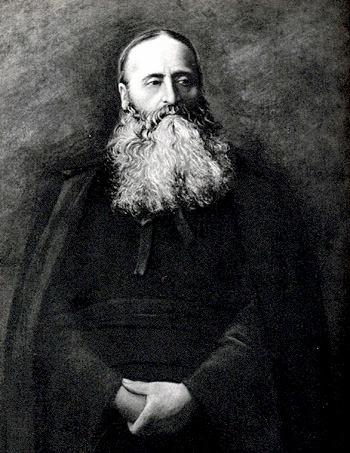 |
The Saint of the Day
St. Ardalion, April 14
Prof. Plinio Corrêa de Oliveira
Biographical selection:
Ardalion was a jester, a burlesque player, who was suddenly converted during a performance while he was ridiculing a Catholic. He died a martyr around the year 300.
Comments of Prof. Plinio:
This man was a kind of clown and was on stage making a parody of Catholic doctrine. Divine grace touched his soul at that moment. His conversion was profound. He immediately announced that fact to his audience, was arrested and then died a martyr defending the very truth that he had mocked before.
What is there in this life that relates to us? There are some very important things.
First is the profound change of his life, a coherent and logical change. Ardalion was a very bad person who fell so low that he was blaspheming publicly. He was, then, one of those cold souls whom God hates, but who are not so odious as those tepid ones which He vomits from His mouth. At a certain moment, this man received an extraordinary grace, corresponded to it, and in that instant changed completely. He was very bad - and he became excellent. This quality of going to the final consequences of a received grace is what we call coherence. One of the consequences of coherence is to defend the Catholic cause against its enemies. He did this when he died a martyr witnessing his Faith.
Therefore, the combativity that should be a characteristic of Catholics in our difficult times, not only to die as a martyr but also to live as a crusader, is a consequence of coherence. So here is a point where St. Ardalion can help us if we pray to him.

Alphonse Ratisbonne was converted in a moment when Our Lady appeared to him at Sant' Andrea delle Fratte in Rome
|
Second, I would like to take another lesson from his life, that is, the strength of divine grace. Many times we see persons who come slowly to the path of Truth, ambling along the many curves with numerous crises and risks. But at times we see sudden and complete conversions. These rapid conversions are not the normal ones; the gradual conversion is what is normal. The sudden conversions are difficult to explain from the psychological point of view, and for this reason they serve to prove the power of God.
God can do everything when a person decides to be with Him. He can “change a stone to a son of Abraham,” to use a metaphor from Scriptures. He can transform a very bad man to an excellent man, if the man concurs with Him. God exercises this power on behalf of prayers that are made to Him.
If we pray, especially if we pray to Our Lady asking her to intercede for us, she can obtain one of these conversions, and make one of us as coherent and saintly as St. Ardalion was. In a single moment a grace can come and change one of us in a way that makes him the opposite of his bad side, so that the best aspirations of his soul are realized.
These sudden graces are the fruit of long prayers. A man converts suddenly, but someone else has offered sacrifices for him, immolated himself or herself for him, prayed for him for long years. This good person saw the other going the wrong way, becoming worse, wandering far from God, and finally, losing the hope of salvation. That good person, however, did not despair. He or she was always there – praying and offering sacrifices. At a certain moment, the bad person converts.
This was what happened in the parable of the prodigal son, who had traveled far from his father’s house. So far that he was reduced to eating the food of the pigs. Then, at a certain moment, he converted.
At times in History, this kind of conversion took place not only with individuals, but also with whole groups or even with peoples. These mass conversions were numerous in the Apostolic times, and also at the beginning of the Middle Ages. The conversion of Clovis and his Franks is an example.
At the dawn of the Reign of Mary, in this phase when the Reign of Mary has not yet been established but is still germinating, we need to ask for these graces, these lightning graces that instantaneously convert men and peoples - in order to change the direction of History. It is not difficult to realize that with this supernatural help, we will win the battle that we need to win. We are living in an epoch of great adversities, and God will, through Our Lady, prepare great deeds.


  |
|
Prof. Plinio Corrêa de Oliveira | |
The Saint of the Day features highlights from the lives of saints based on comments made by the late Prof. Plinio Corrêa de Oliveira. Following the example of St. John Bosco who used to make similar talks for the boys of his College, each evening it was Prof. Plinio’s custom to make a short commentary on the lives of the next day’s saint in a meeting for youth in order to encourage them in the practice of virtue and love for the Catholic Church. TIA thought that its readers could profit from these valuable commentaries.
The texts of both the biographical data and the comments come from personal notes taken by Atila S. Guimarães from 1964 to 1995. Given the fact that the source is a personal notebook, it is possible that at times the biographic notes transcribed here will not rigorously follow the original text read by Prof. Plinio. The commentaries have also been adapted and translated for TIA’s site.
|
Saint of the Day | Home | Books | CDs | Search | Contact Us | Donate

© 2002- Tradition in Action, Inc. All Rights Reserved
|
 |
|